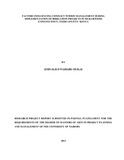| dc.description.abstract | All over the world implementation of the community based irrigation projects involve execution of activities by team leaders elected from the self-help group whose composition is not based on professionalism but by membership and therefore faced with conflict challenges. Effectively managed conflicts can have positive outcomes while unresolved conflict undermines projects and relationships, as well as the morale and reputations of stakeholders. In Kenya the number of irrigation projects by small holders has increased as a result of heavy funding by donors and the government for the last ten years. Despite the huge funding of kshs.165 millions from the Government and Donors, small holder’s irrigation projects in Mukurweini constituency have experience conflict challenges among the management and this have resulted to insufficiently realisation of their objectives. The views that project managers have on resource allocation, management structure, personal differences and communication styles influences successful implementation of irrigation projects. Where project managers have managed to identify, analyze, and evaluate these positive and negative factors influencing conflict within management, successful stimulation and use of conflict to increase the performance of project team members and productivity of the project have been realised. This study aimed at investigating the factors that influence conflict within management at irrigation projects during implementation stage. To achieve this objective, the study was carried out through a descriptive survey method. The selected irrigation projects that were studied are Thiha Sagana, Thiha Micro, Gikondi and Karia irrigation projects. The sample was drawn purposively and entailed the entire management committee managing small holders’ irrigation projects comprising of 52 participants who occupied different leadership positions in the four projects. Data was collected using questionnaire with both open-ended and closed-ended questions. Means, percentages and standard deviations were used to describe the demographic variables of the participants. The study inferred that indeed resource allocation was the biggest influence on conflict within management during the implementation of irrigation projects. However, it was concluded that management structure, personal difference and communication style had no major influence on conflict within management during the implementation of irrigation projects. The study recommends that management committees must allocate resources equitably, sparingly and accountably to minimize conflict within management as result of resources allocation and to maximize performance and production in irrigation projects. | en |

